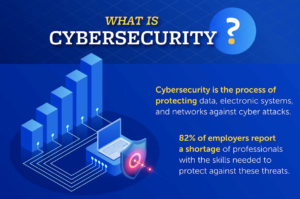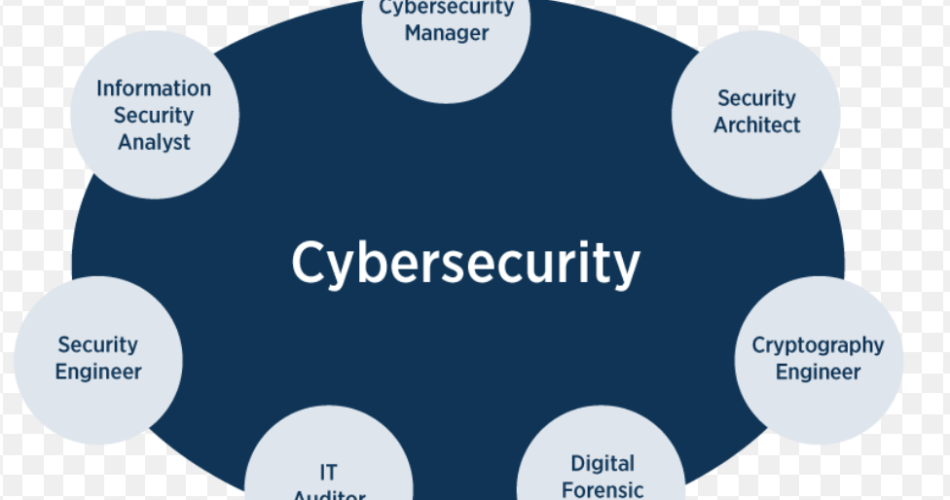Contents
- 1 Cyber Security
- 2 The Importance of a Cyber Security Degree
- 3 Key Skills and Knowledge Gained from a Cyber Security Degree
- 4 Career Opportunities with a Cyber Security Degree
- 5 Top Universities Offering Cyber Security Degrees
- 6 Admission Requirements for a Cyber Security Degree Program
- 7 Online vs. Traditional Cyber Security Degree Programs
- 8 Financial Aid Options for Cyber Security Students
- 9 Internships and Job Placement for Cyber Security Graduates
- 10 Conclusion: The Value of a Cyber Security Degree in Today’s Digital World
Cyber Security
In today’s increasingly digital world, cyber security has become a critical field that plays a vital role in protecting individuals, organizations, and nations from the ever-evolving threats of cyber attacks. As technology continues to advance, the demand for skilled professionals who can safeguard sensitive information and critical infrastructure has never been higher.
Cyber security is a multifaceted discipline that encompasses a wide range of skills and knowledge, from network administration and programming to risk analysis and incident response. It is a field that requires a deep understanding of the latest security technologies, as well as the ability to think critically and adapt to new challenges.

Cyber Security Degree
The Importance of a Cyber Security Degree
Obtaining a cyber security degree is a strategic investment in one’s future, as it provides the comprehensive education and training necessary to excel in this dynamic field. A well-designed cyber security program not only imparts technical expertise but also cultivates essential soft skills, such as problem-solving, communication, and teamwork, which are crucial for success in the industry.
By pursuing a cyber security degree, individuals can gain a competitive edge in the job market, as employers increasingly seek out candidates with specialized knowledge and credentials. Furthermore, a cyber security degree serves as a solid foundation for continued professional development and advancement, enabling graduates to adapt to the ever-changing landscape of cyber threats and technological advancements.
Key Skills and Knowledge Gained from a Cyber Security Degree
A comprehensive cyber security degree program typically covers a wide range of topics, equipping students with the essential skills and knowledge needed to thrive in the industry. Some of the key areas of focus include:
- Network and System Security: Students learn to design, implement, and maintain secure network infrastructures, as well as techniques for identifying and mitigating vulnerabilities.
- Cryptography and Data Protection: Coursework covers the principles of cryptography, data encryption, and access control methods to ensure the confidentiality and integrity of sensitive information.
- Incident Response and Forensics: Students gain expertise in detecting, investigating, and responding to cyber incidents, as well as preserving digital evidence for legal and investigative purposes.
- Risk Management and Compliance: Curriculum explores strategies for assessing and managing cyber security risks, as well as understanding and adhering to relevant industry regulations and standards.
- Ethical Hacking and Penetration Testing: Students learn to think like a hacker, using their skills to identify and exploit system weaknesses in a controlled environment, ultimately strengthening an organization’s overall security posture.
- Programming and Software Development: Many cyber security programs include courses in programming languages, secure coding practices, and the development of security-focused applications and tools.
By mastering these core competencies, graduates of a cyber security degree program are well-equipped to navigate the complex and ever-changing landscape of cyber threats, making them invaluable assets to employers in a wide range of industries.

Cyber Security Degree
Career Opportunities with a Cyber Security Degree
Obtaining a cyber security degree opens the door to a diverse array of career paths, each offering unique challenges and opportunities for growth. Some of the most in-demand cyber security roles include:
- Information Security Analyst: Responsible for planning and carrying out security measures to protect an organization’s computer systems and networks.
- Cyber Security Specialist: Focuses on the implementation and maintenance of security controls, incident response, and security monitoring.
- Penetration Tester: Conducts authorized simulated attacks on an organization’s systems to identify vulnerabilities and recommend remediation strategies.
- Cryptographer: Develops and implements secure encryption methods to protect sensitive data and communications.
- Security Consultant: Provides expert advice and guidance to clients on cyber security best practices, risk assessment, and compliance.
- Security Software Developer: Designs and develops security-focused applications, tools, and platforms to enhance an organization’s overall security posture.
- Chief Information Security Officer (CISO): Serves as the top-level executive responsible for an organization’s cyber security strategy and risk management.
The versatility of a cyber security degree allows graduates to explore a wide range of career paths, from technical roles to managerial positions, in various industries, including finance, healthcare, government, and technology.
Top Universities Offering Cyber Security Degrees
As the demand for cyber security professionals continues to grow, many top-ranked universities have established comprehensive degree programs to meet this need. Some of the leading institutions offering cyber security degrees include:
- Massachusetts Institute of Technology (MIT): Offers a Master of Science in Cybersecurity and Policy, which combines technical and policy-focused coursework.
- Carnegie Mellon University: Renowned for its Bachelor of Science in Information Security and its Master of Science in Information Security.
- Georgia Institute of Technology: Provides a Bachelor of Science in Cybersecurity, as well as a Master of Science in Cybersecurity.
- University of California, Berkeley: Offers a Master of Information and Cybersecurity, focusing on both technical and managerial aspects of cyber security.
- Stanford University: Provides a Master of Science in Computer Science with a concentration in Computer and Network Security.
- Johns Hopkins University: Offers a Master of Science in Cybersecurity, with specializations in areas such as Cyber Operations and Cyber Policy.
- University of Southern California: Provides a Master of Science in Cyber Security Engineering, emphasizing technical skills and hands-on learning.
These are just a few examples of the many prestigious universities that have recognized the importance of cyber security education and are committed to preparing the next generation of cyber security professionals.
Admission Requirements for a Cyber Security Degree Program
Admission requirements for cyber security degree programs can vary depending on the institution, but generally, they include the following:
- Academic Transcripts: Applicants are typically required to submit official transcripts from their previous educational institutions, demonstrating a strong academic record.
- Standardized Test Scores: Many programs may require applicants to submit scores from standardized tests, such as the SAT, ACT, or GRE, depending on the degree level.
- Statement of Purpose: Applicants are often asked to submit a personal statement or essay outlining their academic and professional goals, as well as their motivation for pursuing a cyber security degree.
- Letters of Recommendation: Applicants may need to provide letters of recommendation from professors, employers, or other individuals who can attest to their academic abilities and potential for success in the field.
- Relevant Work or Internship Experience: Some programs may prioritize applicants with prior experience in the cyber security field, such as internships or entry-level positions.
- Technical Skills: Depending on the program, applicants may be required to demonstrate proficiency in areas such as programming, networking, or information technology.
It is important for prospective students to carefully review the specific admission requirements of the cyber security degree programs they are interested in, as these can vary significantly across institutions.
Online vs. Traditional Cyber Security Degree Programs
Both online and traditional on-campus cyber security degree programs offer unique advantages, allowing students to choose the option that best fits their learning preferences and lifestyle.
Online Cyber Security Degree Programs:
- Provide flexibility and convenience, allowing students to learn at their own pace and on their own schedule.
- Offer access to a wider range of program options, as students are not limited by geographic location.
- Often feature self-paced, asynchronous coursework, which can be particularly beneficial for working professionals or students with other commitments.
- May offer more affordable tuition and reduced costs associated with commuting and on-campus living.
- Require strong self-discipline and time management skills to succeed in a virtual learning environment.
Traditional On-Campus Cyber Security Degree Programs:
- Provide face-to-face instruction and opportunities for hands-on, collaborative learning.
- Offer access to state-of-the-art facilities, equipment, and resources, such as specialized cyber security labs and research centers.
- Foster a sense of community and networking opportunities through in-person interactions with faculty and peers.
- Allow students to participate in extracurricular activities, clubs, and professional organizations related to cyber security.
- May be more suitable for students who thrive in a structured, on-campus environment and benefit from the guidance and support of a physical learning community.
Ultimately, the choice between an online or traditional cyber security degree program will depend on the individual’s learning style, personal circumstances, and career goals. Many institutions also offer hybrid programs that combine elements of both online and on-campus learning, providing students with the best of both worlds.
Financial Aid Options for Cyber Security Students
Pursuing a cyber security degree can be a significant financial investment, but there are numerous financial aid options available to help students offset the costs:
- Scholarships: Many universities, as well as private organizations and foundations, offer scholarships specifically for cyber security students based on academic merit, financial need, or other criteria.
- Grants: Federal and state governments, as well as private entities, provide need-based grants to help cover tuition and other educational expenses.
- Student Loans: Federal and private student loans can be used to finance a cyber security degree program, with options such as subsidized, unsubsidized, and PLUS loans.
- Employer Tuition Reimbursement: Some employers may offer tuition reimbursement or assistance programs for employees pursuing relevant degrees, such as a cyber security degree.
- Military and Veteran Benefits: Active-duty service members, veterans, and their dependents may be eligible for various educational benefits, such as the GI Bill, to help fund a cyber security degree.
- Work-Study Programs: On-campus work-study opportunities can provide students with part-time employment and financial assistance to help cover educational expenses.
- Fellowships and Assistantships: Some cyber security degree programs offer fellowships or research or teaching assistantships, which can provide financial support in exchange for work experience.
By exploring these diverse financial aid options, students can make a cyber security degree more accessible and affordable, ensuring that their educational and career goals are within reach.
Internships and Job Placement for Cyber Security Graduates
Completing a cyber security degree program not only equips students with the necessary knowledge and skills but also provides valuable opportunities for hands-on experience and professional networking, which can significantly enhance their post-graduation job prospects.
Internships:
- Many cyber security degree programs incorporate internship opportunities, allowing students to apply their classroom learning in a real-world, supervised setting.
- Internships provide students with practical experience in areas such as network security, incident response, penetration testing, and risk management.
- These internships often lead to full-time job offers, as employers value the practical skills and industry exposure gained by the student.
Job Placement:
- Cyber security degree programs typically maintain strong relationships with industry partners and employers, facilitating job placement opportunities for their graduates.
- Career services departments within these programs often provide resources such as resume workshops, mock interviews, and job search assistance to help students transition smoothly into the workforce.
- The in-demand nature of cyber security professionals, coupled with the specialized skills gained through a degree program, makes cyber security graduates highly sought-after by employers across various sectors.
Continuing Education and Certifications:
- Cyber security degree programs may also encourage and support students in pursuing additional industry-recognized certifications, such as the Certified Information Systems Security Professional (CISSP) or the Certified Ethical Hacker (CEH).
- These certifications, combined with the foundational knowledge acquired through the degree program, further enhance the marketability and career advancement opportunities for cyber security graduates.
By leveraging the internship and job placement resources provided by their cyber security degree programs, students can gain a competitive edge in the job market and embark on rewarding careers in this dynamic and rapidly evolving field.
Conclusion: The Value of a Cyber Security Degree in Today’s Digital World
In the face of ever-evolving cyber threats and the increasing reliance on digital technologies, the value of a cyber security degree has never been more apparent. This specialized education equips individuals with the comprehensive knowledge, technical expertise, and critical-thinking skills necessary to protect organizations, safeguard sensitive information, and navigate the complex landscape of cyber security.
Explore the transformative opportunities a cyber security degree can offer by contacting the admissions team at your preferred university today. Take the first step towards a rewarding career in this in-demand field and secure your place in the digital future.
By investing in a cyber security degree, students position themselves for success in a rapidly growing industry, with the potential to make a significant impact on the safety and security of our digital world. Whether pursuing a career as a security analyst, penetration tester, or chief information security officer, a cyber security degree provides the foundation for a fulfilling and impactful profession that is essential in today’s technology-driven landscape
